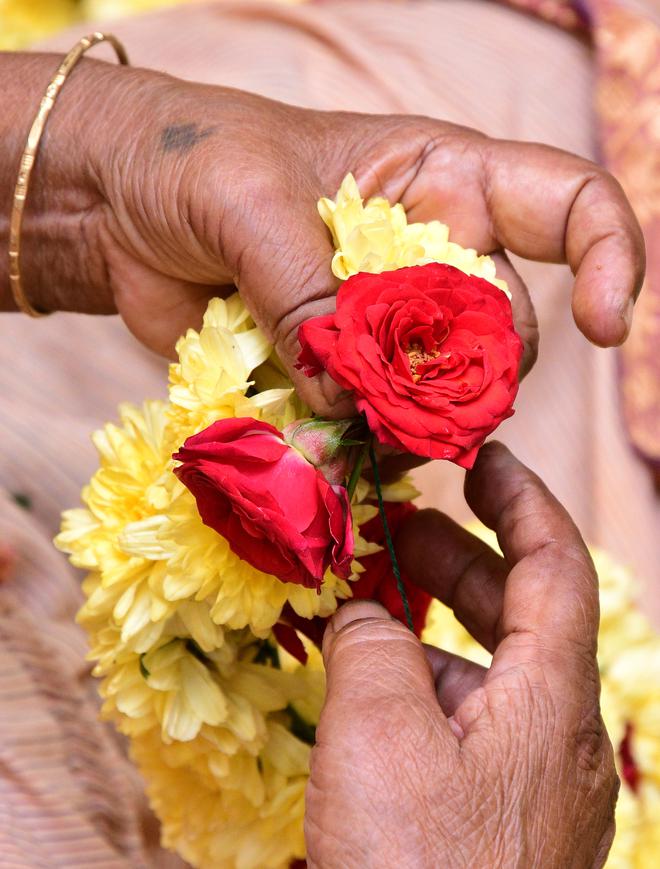As jasmine season begins, we meet women living near R S Puram’s flower market who string flowers from home
As jasmine season begins, we meet women living near R S Puram’s flower market who string flowers from home
S Adhil stirs gently in the cradle. The four-month-old sleeps enveloped by the fragrance of yellow and orange marigolds his mother Haseena Banu is stringing. Seated next to him, her fingers churn out a steadily growing sunshine-hued string of the flowers. “This is for a temple in Kerala,” she shares, an eye on the marigolds, the other on her baby.
Haseena works along with four women at Sabarish Flowers located in the maze of streets behind the old flower market in Coimbatore’s RS Puram. Hundreds of women like her work from home and from shops in these streets, stringing flowers for temples, events, and weddings at places as far as Dubai and Sharjah.
This is an industry powered solely by women. “Flower sellers buy flowers in bulk from the market and drop them off at our houses in the morning,” says 35-year-old R Veeramani, whose husband owns Sabarish Flowers. “We string them for a pay,” she explains. “We get paid per kilogram and get to make around ₹200 a day, or more on peak seasons.” For jasmine, the women are paid ₹60 to ₹80 per kilogram, and for bigger ones such as chrysanthemums, the pay is ₹20.
The craft has been the chief source of income for women here for decades
| Photo Credit: Siva Saravanan S
Agents with contacts abroad also reach out to them. “My agent ships flowers on a 2pm flight that leaves for Dubai from Coimbatore,” says Veeramani. “He brings flowers at 8am when there are orders.” Veeramani says that for orders abroad, she gets ₹120 per kilogram. “We string the jasmine while they are still buds, and they are placed inside plastic covers and packed in boxes with ice. The trick is to not sprinkle any water; this way, they remain fresh for up to three days,“ she explains. Now that the winter months are behind us, the jasmine season has picked up, and Veeramani is expecting a steady increase in orders from March onwards.

Walk into any household in the neighbourhood, and you can see them seated in courtyards as a small group, stringing flowers
| Photo Credit: Siva Saravanan S
Walk into any household in the neighbourhood, and you can see them seated in courtyards as a small group, stringing flowers, chatting away. The craft has been the chief source of income for women here for decades. They work to the background score of cooker whistles and crying babies, their flowers sometimes travelling thousands of kilometres to adorn a bride’s hair.
M Valliammal is seated in her living room, a small heap of jasmine in front of her. A Tamil serial blares on the TV and she works with her eyes on the flowers, her ears keen on the dialogues onscreen. “My daughter-in-law and I start stringing flowers as soon as we are done with household chores for the day,” says the 65-year-old. P Ganapathy Ammal, the flower seller who employs Valliammal’s services, is seated by the front door, waiting for her to be done.
On a street nearby, V Visalakshi and B Bhuvaneswari string jasmine at the latter’s verandah. Visalakshi has been working for 20 years now, living on her own terms and supporting her children after her husband left her: these women have been working from home long before such a term was invented.
Ask any of them how they learned to string flowers and they scoff. “No one teaches you these things,” Valliammal says, “You just watch and learn.”
R Santhamani, however, says she practised with twigs and matchsticks when she was a teenager. Now 60 years old, she has been working with flowers “ever since a kilogram of jasmine cost ₹2”. (In December last year, the price of a kilogram of jasmine went up to as much as ₹4,000 in Madurai) Santhamani does not know where the flowers she has strung have travelled to. All she knows is that it enabled her to earn an income, and look after her family.
Haseena stays a few streets away from the shop and prefers to work there. Her older son goes to an Anganwadi located a few blocks away. It can be quite a task to supervise her toddler while she focusses on her flowers. “But I have a lot of support here,” says the 23-year-old, adding with a smile, “Everyone on this street knows him… In fact, they practically raised him while I worked.”
“This is a luxury for many people even today,” she says. Santhamani lives in a tile-roofed house in between two tall buildings. “I could have earned much more if I had opted for some other job,” she says. “But there is something comforting about a job that lets you work while the kuzhambu bubbles on the stove and your child does her homework beside you.”
Fragrant cargo
Flowers sold at Coimbatore’s market are sourced from villages and towns nearby, including from Sathyamangalam, Karamadai, and Kallipatti. Roses come from Hosur
It takes two hours for the flowers to reach the market, and another half-an-hour for them to reach the people who string them
Flowers being exported are shipped the same day in polystyrene boxes packed with ice
Source: UVS Selvakumar, President, Coimbatore District Flower Merchants Association
























